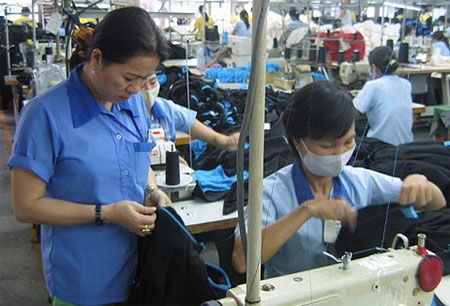Businesses bemoan loan-shark interest rates
 |
| Many factories have to cut production, or even shut down due to capital shortage |
After a government resolution in February adopting anti-inflation measures, banks have tightened business loans, leaving many facing severe operating capital shortages.
At a recent national meeting of young business associations held in Ho Chi Minh City, chairman of Nam Dinh Province’s Young Business Association Tran Xuan Mai said that his firm, which specialises in producting handicraft products for exports, was in dire need of capital but they were unable to access bank loans.
“Despite winning an export deal worth millions of dollars, we’ve had to take out loans at 9 per cent per month – an annual rate of 108 per cent,” Mai added.
Nguyen Thi Hue from Kon Tum province’s Young Business Association, said urgent measures needed to be adopted to save companies from borrowing from loan sharks, if not, a range of businesses would face bankruptcy.
Chairman of the Vietnam Young Business Association Vo Quoc Thang, was cited by Tuoi Tre as saying that the tightened credit policy for non-production sector (mainly real estate, personal consumer loans and securities) was having a negative impact on as many as 200 industries in the production sector, including those in the fields of glasses, cements, brick production, and wood.
“Many factories have to cut production, or even shut down, and a lot of workers have lost their jobs,” he noted, adding that a remarkable number of Vietnamese companies have had to sell stakes to foreign partners, putting them at risk of being bought out.
In April, the State Bank of Vietnam instructed that all commercial banks needed to restrain credit growth below 20 per cent in an effort to curb inflation. But in the first six months of this year, total credit growth has only topped 7 per cent. Many enterprises are demanding more flexibility, saying that the government should employ market instruments instead of administrative policies.
Huynh Cong Thich from Bac Lieu province’s Young Business Association said: “The highest disparity between deposit and lending interest rates is just 0.3 per cent, therefore the maxim lending interest rate should be 17 - 18 per cent per annum, however, companies are having to pay much higher rates.”
Too many banks have been listed as one of the causes of the increased interest rates, Thich claimed.
According to deputy chairman of Dak Lak Young Business Association Phan Dinh Tue, the central bank should lift the credit ceiling on certain banks to enable effective enterprises to access bank loans to maintain production.
“The central bank should also monitor the bank lending, to make sure that loans go to the production and export sectors,” he said, emphasising the necessity to create an equal business environment for both private and state-owned firms.
What the stars mean:
★ Poor ★ ★ Promising ★★★ Good ★★★★ Very good ★★★★★ Exceptional
Related Contents
Latest News
More News
- Hermes joins Long Thanh cargo terminal development (February 04, 2026 | 15:59)
- SCG enhances production and distribution in Vietnam (February 04, 2026 | 08:00)
- UNIVACCO strengthens Asia expansion with Vietnam facility (February 03, 2026 | 08:00)
- Cai Mep Ha Port project wins approval with $1.95bn investment (February 02, 2026 | 16:17)
- Repositioning Vietnam in Asia’s manufacturing race (February 02, 2026 | 16:00)
- Manufacturing growth remains solid in early 2026 (February 02, 2026 | 15:28)
- Navigating venture capital trends across the continent (February 02, 2026 | 14:00)
- Motivations to achieve high growth (February 02, 2026 | 11:00)
- Capacity and regulations among British areas of expertise in IFCs (February 02, 2026 | 09:09)
- Transition underway in German investment across Vietnam (February 02, 2026 | 08:00)

 Tag:
Tag:




















 Mobile Version
Mobile Version